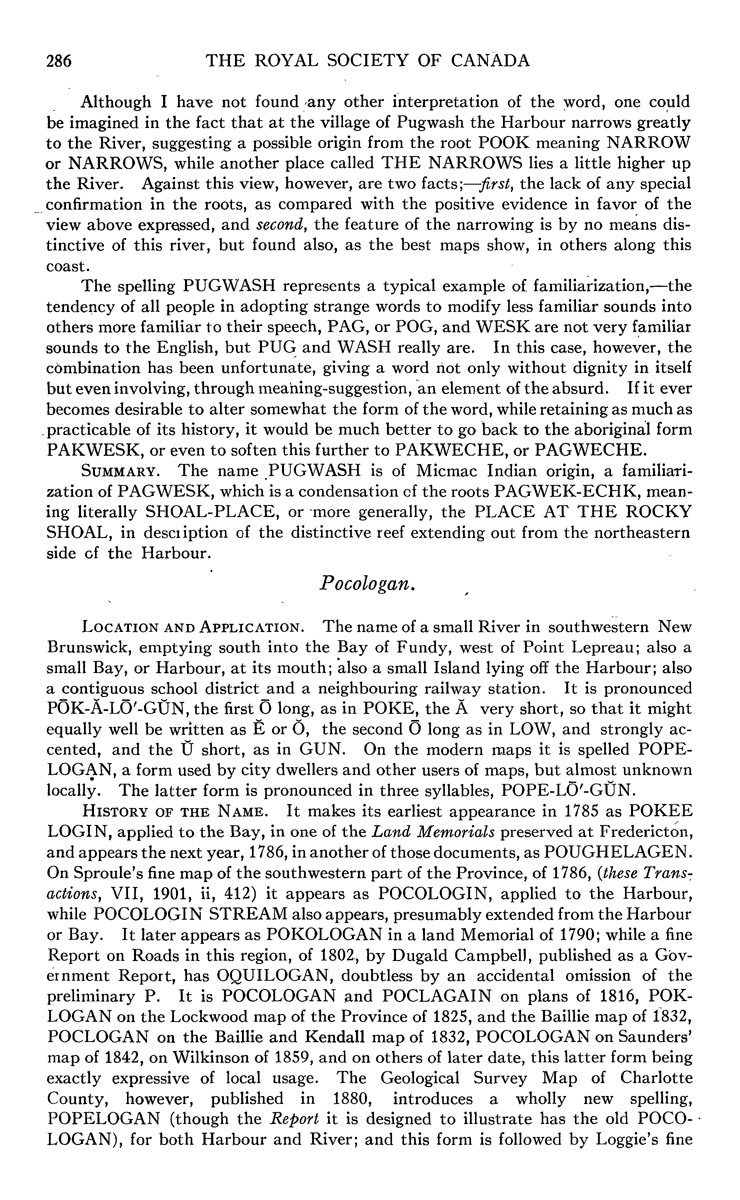286 THE ROYAL SOCIETY OF CANADA
Although I have not found any other interpretation of the word, one could
be imagined in the fact that at the village of Pugwash the Harbour narrows greatly
to the River, suggesting a possible origin from the root POOK meaning NARROW
or NARROWS, while another place called THE NARROWS lies a little higher up
the River. Against this view, however, are two facts;—first, the lack of any special
confirmation in the roots, as compared with the positive evidence in favor of the
view above expressed, and second, the feature of the narrowing is by no means dis¬
tinctive of this river, but found also, as the best maps show, in others along this
coast.
The spelling PUGWASH represents a typical example of familiarization,—the
tendency of all people in adopting strange words to modify less familiar sounds into
others more familiar to their speech, PAG, or POG, and WESK are not very familiar
sounds to the English, but PUG and WASH really are. In this case, however, the
combination has been unfortunate, giving a word riot only without dignity in itself
but even involving, through meaning-suggestion, an element of the absurd. If it ever
becomes desirable to alter somewhat the form of the word, while retaining as much as
. practicable of its history, it would be much better to go back to the aboriginal form
PAKWESK, or even to soften this further to PAKWECHE, or PAGWECHE.
Summary. The name PUGWASH is of Micmac Indian origin, a familiari¬
zation of PAGWESK, which is a condensation cf the roots PAGWEK-ECHK, mean¬
ing literally SHOAL-PLACE, or more generally, the PLACE AT THE ROCKY
SHOAL, in description of the distinctive reef extending out from the northeastern
side of the Harbour.
Pocologan.
Location and Application. The name of a small River in southwestern New
Brunswick, emptying south into the Bay of Fundy, west of Point Lepreau; also a
small Bay, or Harbour, at its mouth; also a small Island lying off the Harbour; also
a contiguous school district and a neighbouring railway station. It is pronounced
POK-A-LO'-GtJN, the first O long, as in POKE_, the A very short, so that it might
equally well be written as E or O, the second O long as in LOW, and strongly ac¬
cented, and the U short, as in GUN. On the modern maps it is spelled POPE-
LOGAN, a form used by city dwellers and other users of maps, but almost unknown
locally. The latter form is pronounced in three syllables, POPE-LO'-GUN.
History of the Name. It makes its earliest appearance in 1785 as POKEE
LOGIN, applied to the Bay, in one of the Land Memorials preserved at Fredericton,
and appears the next year, 1786, in another of those documents, as POUGHELAGEN.
On Sproule's fine map of the southwestern part of the Province, of 1786, {these Trans¬
actions, VII, 1901, ii, 412) it appears as POCOLOGIN, applied to the Harbour,
while POCOLOGIN STREAM also appears, presumably extended from the Harbour
or Bay. It later appears as POKOLOGAN in a land Memorial of 1790; while a fine
Report on Roads in this region, of 1802, by Dugald Campbell, published as a Gov¬
ernment Report, has OQUILOGAN, doubtless by an accidental omission of the
preUminary P. It is POCOLOGAN and POCLAGAIN on plans of 1816, POK-
LOGAN on the Lockwood map of the Province of 1825, and the Baillie map of 1832,
POCLOGAN on the Baillie and Kendall map of 1832, POCOLOGAN on Saunders'
map of 1842, on Wilkinson of 1859, and on others of later date, this latter form being
exactly expressive of local usage. The Geological Survey Map of Charlotte
County, however, published in 1880, introduces a wholly new spelling,
POPELOGAN (though the Report it is designed to illustrate has the old POCO- •
LOGAN), for both Harbour and River; and this form is followed by Loggie's fine
|








